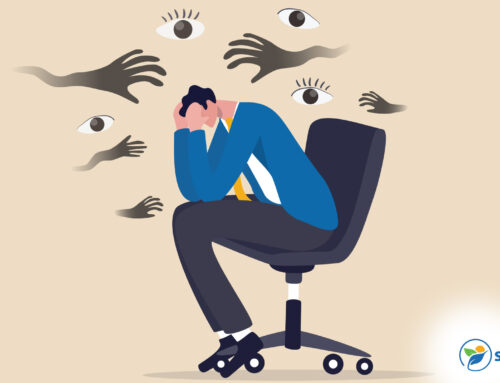Depression affects more than 17 million adults and a little less than 2 million children in the United States. Although more prevalent in women than men, depression is one of the most common mental health issues facing the American population overall. Treatment for depression often involves a combination of therapies and medications, lifestyle changes and community support.
One commonly prescribed group of medications is SSRIs. If you’ve recently been prescribed an SSRI, you may be wondering how long it takes for antidepressants to work. Today, we’ll answer this question and provide additional valuable information to help you better understand your new medication.
How Do SSRIs Work?
Antidepressants work by raising the levels of certain chemicals called neurotransmitters in the brain. The job of neurotransmitters is to help regulate stress levels and our mood, so when these chemicals are out of balance, they can cause various problems, including depression or anxiety. The primary neurotransmitters your brain uses include dopamine, serotonin and norepinephrine.
Selective serotonin reuptake inhibitors, or SSRIs, work by preventing the reabsorption of serotonin after it carries a message from one nerve cell to another. By preventing this reabsorption, SSRIs increase the serotonin in your brain, which can provide numerous benefits. For example, you may have a more balanced mood and find it easier to sleep at night after regularly taking an SSRI. Common SSRI medications include Lexapro, Prozac and Zoloft.
How Long Does It Take for SSRIs to Work?
How long does it take for depression meds to work? The answer depends on what medications you’re taking. Although there are several “quick-acting” antidepressant options available, SSRIs don’t function that way. Instead, they help slowly increase the serotonin in your body until you reach operational levels.
This process can take 6 to 8 weeks before you feel the full effects of your medication, which is why you shouldn’t stop before the medication has been given enough time to take effect. Although it can take 2 months for full results, many people see minor improvements within a few days or weeks after starting their SSRI.
Checking In With Your Doctor
Generally, your doctor will schedule a follow-up appointment about one month after you begin taking your antidepressant. Using a questionnaire or some basic questions, they’ll gauge whether the medications are having any positive effect on your symptoms, even if this isn’t enough time to see full results.
During this follow-up appointment (or at your initial consultation), you can ask your doctor how long it will be until antidepressants kick in. Because timelines vary based on your unique symptoms, health history and the exact SSRI prescribed, your doctor can provide a more definitive answer on when you should start seeing results.
What Effects Should You Expect as Your System Builds Up to Operational Levels of Using an SSRI?
It’s common to feel some side effects while your body adjusts to taking an SSRI. However, these side effects are temporary for most people and should lessen or disappear entirely once your body has adjusted. The time frame for adjustment is about the same as how long it takes for antidepressants to work, which is about 2 months.
Common SSRI side effects include:
- Digestive problems. Nausea, diarrhea, constipation and a generally upset stomach are common when taking an SSRI. Some people experience vomiting, but this is much less common and should be discussed with your doctor.
- Sexual health issues. People on antidepressants commonly feel a low or decreased sex drive, and men may have problems getting or maintaining an erection. These problems should go away after a few months, but inform your doctor if symptoms persist.
- Other side effects. Headaches are one of the most common side effects and can range from mild to severe. Severe headaches should be discussed with your doctor, especially if they interfere with your daily life. Fatigue and sleep problems (especially insomnia) are also common.
While side effects can be expected, you should report them to your doctor. If the side effects are severe or interrupt your daily life, your doctor may decide to try a different medication for your depression.
Managing SSRI Side Effects
Some SSRI side effects can be effectively managed so you can continue taking your medication. For example, if your SSRI causes insomnia, try taking it first thing in the morning instead of in the evening. On the other hand, if your SSRI makes you drowsy, take it at night. If you get mild or moderate headaches, choose a time during the day when you can rest in a quiet room if needed. Finally, digestive problems can sometimes be managed by taking your SSRI with food. Saltine crackers and ginger ale have been found to help with nausea or vomiting in some people.
Will You Need to Take Antidepressants Forever?
Some people need to take antidepressants for the rest of their lives, while others find that short-term usage is all they need. When your doctor prescribes your antidepressant, talk to them about how long they expect you to take them. If you hope only to take an SSRI short term, discuss it with your doctor.
If your doctor suggests you commit to taking your SSRI forever, ask them why. One reason may be that there’s a very high depression relapse rate for people who stop taking antidepressants once prescribed. If you stop taking your SSRI under doctor’s orders and find that your depression symptoms return, you may be one of those who need to take the prescription forever. Often, this is because your body naturally doesn’t create enough serotonin or gets rid of it too fast. There’s nothing wrong with taking an SSRI forever if that’s what you need to do, and it can help you continue to have a high quality of life.
Continue Taking Your SSRI, Because It Does Get Better
While the process of adjusting to an SSRI can be challenging for some people, it does get better. Continuing your antidepressants can lead to more balanced moods, a higher quality of sleep and an overall more enjoyable life. But remember, the initial side effects are only temporary.
If you need help managing your medications or believe more mental health treatment options may help, don’t hesitate to reach out. Contact us now to learn more about how we can help you manage your depression. Our compassionate mental health professionals are ready to take your call 24/7.






